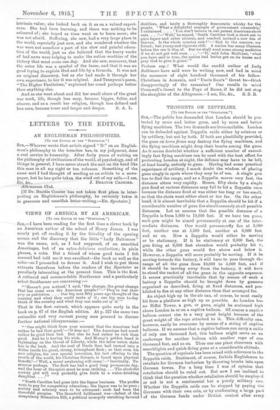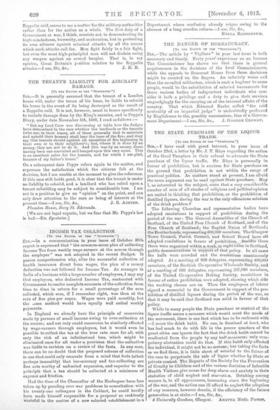THOUGHTS ON ZEPPELINS.
[To VII EDITOR Or Ter esieccuros."1 Stu,—The public has demanded that London should be pro- tected by more and better guns, and by more and better flying machines. The two demands are irreconcilable. London can be defended against Zeppelin raids either by aviators or by artillery, but not by both. If both are plentifully provided, the guns oil terra firma may destroy the flying machines, and the flying machines might drop their bombs among the gene. As it seems doubtful whether a sufficient number of exceed- ingly fast flying machines can be used with the best effect for protecting London at night, the defence may have to be left, at least locally, entirely to guns. Having bad some practical experience of artillery, I much doubt the wisdom of placing guns singly in spots where they may be of use. A single gun has to find the range, and as a Zeppelin moves very fast, the distance alters very rapidly. Hence, fifty shots by a single gun fired at various distances may fail to hit a Zeppelin once because the distance fired at was either too long or too small, so that the shots went either short or too far. On the other hand, it is almost inevitable that a Zeppelin should be hit if a considerable number of guns fire simultaneously at all possible distances. Let us assume that the possible distance of a Zeppelin is from 5,000 to 10,000 feet. If we have ten guns, each gun might be aimed permanently at one of the inter. mediate distances. One would permanently fire at 5,000 feet, another one at 5,500 feet, another at 6,000 feet. and so on. Now a Zeppelin would either be moving or he stationary. If it be stationary at 8,000 feet, the gun firing at 8,000 feet elevation would probably hit it, while the other guns would fire above and below it. However, a Zeppelin will more probably be moving. If it be moving towards the battery, it will have to pass through the range of all the guns from 10,000 to 5,000 feet, and if it should be moving away from the battery, it will have to stand the racket of all the guns in the opposite sequence. It seems practically inevitable that by means of such a battery a Zeppelin should be brought down by gunners organized as described, firing at fixed distances, and pro- hibited to fire at any other distance than that arranged for.
An object high up in the air can, of Course, be most easily hit from a platform as high up as possible. As London has no Eiffel Tower, a gun, or guns, might be stationed high above London in or on a captive balloon. Of course a captive balloon cannot rise to a very great height because of the great weight of the rope attached to it. This difficulty can, however, easily be overcome by means of a string of captive balloons. If we assume that a captive balloon can carry a cable of only one thousand feet, this balloon might serve as all anchorage for another balloon with another rope of one thousand feet, and so on. Thus one can place observers with searchlights and quick-firing guns at n considerable altitude. The question of reprisals has been raised with reference to the Zeppelin raids. Sentiment, of course, forbids Englishmen to retaliate for German barbarism by throwing bombs into open German towns. For a long time I was of opinion that retaliation should be ruled out. But now I am inclined to think that the question whether retaliation should be employed or not is not a sentimental but a purely military one.. Whether the Zeppelin raids can be stopped by paying the Germans with their own coin, or by confiscating a large part
of the German funds under British control after every
Government at war, I think, consists not in demonstrating its NULLA RETRORS1JM.
high-mindedness, humanity, and moderation, but in protecting its own citizens against criminal attacks by all the means which such attacks call for. Men fight fairly in a fair fight, but even the most high-principled man will not disdain using any weapon against an armed burglar. That is, in my opinion, Great Britain's position relative to the Zeppelin

















































 Previous page
Previous page